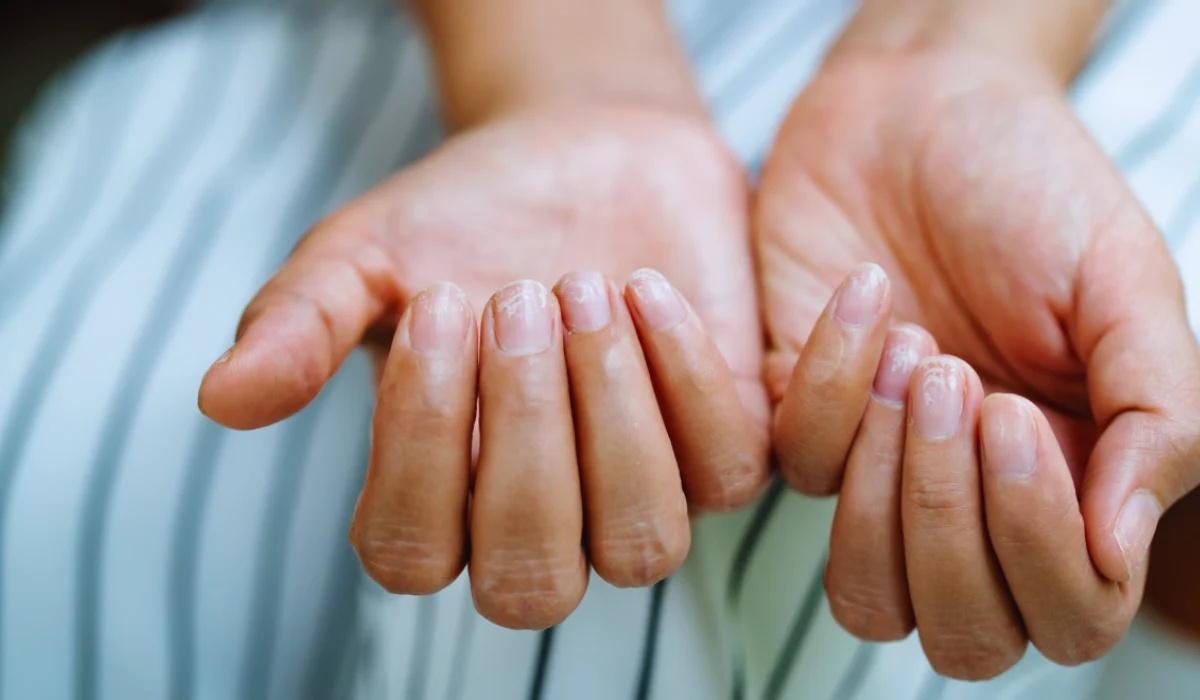Menopause is a natural stage in a woman’s life. It brings significant hormonal changes that can affect the health of fingernails. Many women experience weakened and brittle nails during and after menopause. Fortunately, there are effective ways to strengthen nails after menopause. This article delves into practical tips to strengthen nails after menopause.
Nourish From Within
A balanced can do wonders for your overall health. Nail strength depends on the essence of nutrients such as biotin, vitamins A and C, and minerals like zinc, iron, and protein. Eggs, dairy, leafy greens, nuts, lean meats, and other foods contain these nutrients.

Stay Hydrated
Hydration plays a key role in maintaining healthy nails. Dehydration can lead to dry and brittle nails. Hydrated nails are less prone to breaking and splitting. Hydration is a simple yet effective step in keeping one’s nails healthy.
Protect your Nails
Daily activities can expose your nails to damage. Protecting your nails from harsh environments and chemicals is vital to minimize this damage. Wear gloves while doing chores like cleaning or gardening to keep yourself safe. To avoid nails getting caught or broken, trim them regularly. These protective measures can reduce the risk of nail damage.
Moisturize Your Cuticles
The health of your cuticles directly affects the strength of your nails. Dry, cracked cuticles can lead to weaker nails. Regularly moisturizing your cuticles with a nourishing lotion or cream can prevent cracking. Massaging the cuticles also stimulates the nails’ circulation to grow properly, allowing moisturizer to penetrate deeply. Products that contain natural ingredients like vitamin E, jojoba oil, or shea butter are exceptionally effective.
Avoid Harsh Nail Products
Some nail care products can cause more harm than good. These nail products contain harsh chemicals. For instance, acetone-based nail polish removers may strip the nails of natural oils, making them dry and brittle. Likewise, polishes containing formaldehyde, toluene, and dibutyl phthalate can also damage the nail. Choosing acetone-free removers and nail polishes free of harmful substances is a healthier choice.
Trim and File Carefully
Regular trimming and careful filing are necessary for maintaining healthier nails. Long nails are more prone to breaking, so it is advisable to keep them at a moderate length. When trimming, use sharp, clean nail clippers or scissors, and avoid cutting the nails too short to prevent discomfort and potential damage. Filing should be done gently, using a fine-grit file to shape the nails.
Consider Supplements
If your diet might not provide all the nutrients you need, considering dietary can be a good option. Supplements such as biotin, omega-3 fatty acids, and multivitamins can provide a helpful boost to your nail health. Biotin is known for its ability to strengthen nails and reduce their bitterness. However, consulting with your healthcare provider before taking any supplements is wise. They can offer guidance on the appropriate dosage for your specific needs, ensuring you get the benefits safely and effectively.
Avoid Overexposure to Water
Frequent and prolonged water exposure can weaken nails, making them more prone to splitting and peeling. Activities like washing dishes or long baths can strip the nails of their natural oils. Wearing waterproof gloves when doing tasks that involve prolonged water contact can protect the nails.
Maintaining Good Hand Hygiene
Good hand hygiene is paramount for overall health. However, excessive washing or harsh soaps can dry out nails and cuticles. Opt for mild, moisturizing hand soaps and avoid over-washing your hands. After washing, applying a nourishing hand cream or lotion can replenish moisture and keep the nails and cuticles hydrated. This practice is indispensable during or after menopause.
Key Takeaways:
- Menopause can weaken the nails.
- Nutrients like biotin and vitamins strengthen nails.
- Drinking plenty of water keeps nails healthy.
- Wearing gloves to protect nails is important.
- Regularly trim and file nails to prevent breakage.
- Use gentle and nourishing products.
In summary, you can care for weak nails during and after menopause with the proper attention. Improve your nails by doing these easy things every day. Taking care of your nails involves several essential steps. You need to eat well and drink enough water to keep them healthy. It is also important to shield your nails from harm and use gentle, nourishing products.